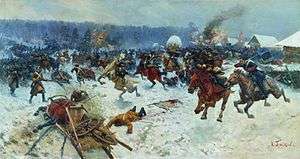Erastvere
| Erastvere Erästvere (Võro) | |
|---|---|
| Village | |
 Erastvere Location in Estonia | |
| Coordinates: 57°58′57″N 26°47′25″E / 57.98250°N 26.79028°ECoordinates: 57°58′57″N 26°47′25″E / 57.98250°N 26.79028°E | |
| Country | Estonia |
| County | Põlva County |
| Municipality | Kanepi Parish |
| First mentioned | 1452 |
| Population (2011 Census[1]) | |
| • Total | 286 |
Erastvere (German: Errestfer, Võro: Erästvere) is a village in Kanepi Parish, Põlva County in southeastern Estonia. It is located just southeast of Kanepi, the centre of the municipality, and is passed by the Tallinn–Tartu–Võru–Luhamaa road (E263). As of 2011 Census, the village's population was 286.[1]
The village centre is situated by the 16.3 ha Lake Erastvere, which is the origin of the Ahja River. The Võhandu River also passes Erastvere on its western side. Erastvere is the site of the former Erastvere (Errestfer) knight manor.[2] The main building hasn't survived, a newer nursery home building is located on the site.
On 9 January 1702 [O.S. 29 December 1701], during the Great Northern War, the Battle of Erastfer took place about 3 km southeast of Erastvere in nowadays Magari village. The Russian troops with 18,800 men took the victory over the Swedish 2,470 men. It was the first significant Russian victory in the Great Northern War.
Gallery
-

Main building of Erastvere Manor
-

The Battle of Erastfer, painted by Mitrofan Grekov in 1914.
References
- 1 2 "Population by place of residence (settlement), sex and age". Statistics Estonia. 31 December 2011. Retrieved 31 May 2013.
- ↑ "Erastvere küla" (in Estonian). eestigiid.ee. Retrieved 29 March 2013.
External links
- Erastvere Nursing Home (Estonian)
| ||||||||||||

